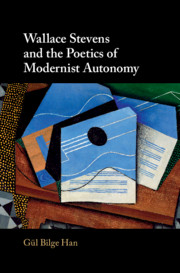Book contents
- Wallace Stevens and the Poetics of Modernist Autonomy
- Wallace Stevens and the Poetics of Modernist Autonomy
- Copyright page
- Epigraph
- Dedication
- Contents
- Acknowledgments
- Abbreviations
- Introduction
- Chapter 1 The Politics of Aesthetic Separation
- Chapter 2 Spaces of Autonomy
- Chapter 3 Community and Autonomy
- Chapter 4 Autonomy and Philosophy
- Coda
- Bibliography
- Index
Chapter 4 - Autonomy and Philosophy
“Reason’s Constant Ruin”
Published online by Cambridge University Press: 17 June 2019
- Wallace Stevens and the Poetics of Modernist Autonomy
- Wallace Stevens and the Poetics of Modernist Autonomy
- Copyright page
- Epigraph
- Dedication
- Contents
- Acknowledgments
- Abbreviations
- Introduction
- Chapter 1 The Politics of Aesthetic Separation
- Chapter 2 Spaces of Autonomy
- Chapter 3 Community and Autonomy
- Chapter 4 Autonomy and Philosophy
- Coda
- Bibliography
- Index
Summary
Chapter 4 focuses on Stevens’ conception of autonomy with the purpose of reassessing his poetry’s relation to philosophy. Stevens not only thematizes this relation in his poetry, but also identifies the processes that decouple the reflective operations of poetic thinking from that of philosophy. The chapter explores this aspect of Stevens’ work from the 1930s and 1940s in dialogue with Badiou’s “inaesthetics,” which allows for a consideration of poetry as a site for thinking without the support or guidance of philosophical discourse. The notion of inaesthetics becomes the enabling occasion for a focus on the divergences, rather than the affinities, between Stevens and philosophy, and for a move to a historically contextualized understanding of his poetry’s resistance to the philosophical school of logical positivism. Stevens’ skepticism toward logical positivism must be added to the historical factors behind his increased emphasis on poetic autonomy from philosophy in his writing of this period.
Keywords
- Type
- Chapter
- Information
- Wallace Stevens and the Poetics of Modernist Autonomy , pp. 139 - 169Publisher: Cambridge University PressPrint publication year: 2019

